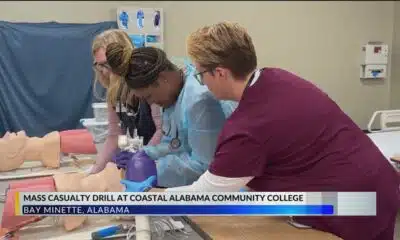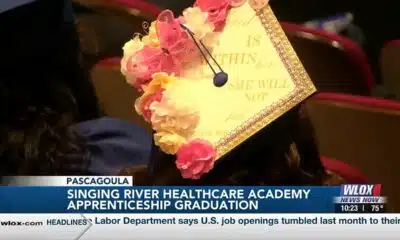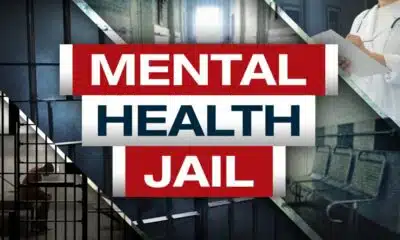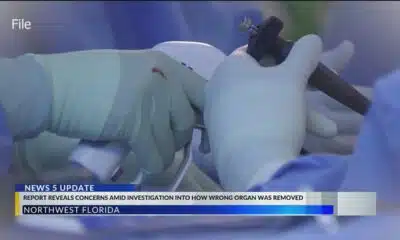Mississippi News
Most Mississippi children miss out on critical developmental screenings
Developmental screenings can change a child’s life. In Mississippi, most young kids don’t get them.
Katina Spaulding’s daughter started walking at 15 months. Spaulding thought that was normal: This was her first child, and she had no one to compare her to.
But when Spaulding enrolled her daughter in the Head Start program in Biloxi, a developmental screening revealed she wasn’t learning at her age level. Additional tests showed the little girl couldn’t hear properly because her eardrum was full of fluid.
“That made her walk late, talk late– she wasn’t connecting the dots,” Spaulding said.
The screenings revealed the problem and pointed the way to solutions. Spaulding’s daughter, now 16, was able to get treatment.
“I would haven’t been able to get any of that without the screening,” said Spaulding, who now works as a family health service specialist at the Moore Community House Early Head Start Program in Biloxi. “My baby would have been worse off.”
But the experience of Spaulding’s family is not typical in this state. In 2016, only about 17% of Mississippi kids under three years old completed a developmental screening, according to a national survey– the lowest rate in the country and well below the national average of 30%. That means Mississippi kids often aren’t able to access services and treatments to help them catch up to peers.
Early childhood experts say the picture is improving. Funded by a $17 million federal grant, the Mississippi Thrive Child Health and Development Project has spent the last five years working to improve children’s developmental health, including by increasing screenings. In recent years the share of kids completing screenings has put Mississippi closer to the middle of the pack nationally– but that still means most kids aren’t getting screened, said principal investigator and University of Mississippi Medical Center pediatrician Dr. Susan Buttross.
And with an estimated 15% of all kids experiencing a developmental delay, many Mississippi children start school with developmental delays still unidentified and untreated, affecting their ability to learn and shaping how their teachers and peers relate to them.
Spaulding worries about what that means for them as they grow and try to learn in classrooms that aren’t always designed to give them individualized attention.
“If your shoes ain’t tied like Johnny’s shoes, your shoes ain’t right,” she said. “That child gotta find their way. So where are they? They’re lost. They’re labeled.”
Developmental screening involves reviewing a checklist to see whether a child has reached milestones for their age. At the center where Spaulding works, the screener for babies under three months asks caregivers to answer questions like: “Does your baby smile when you talk to him? When your baby is on her back, does she kick her legs?”
The screenings can identify early whether a child has a developmental delay, and research shows intervention before a child is 5 years old improves long-term outcomes.
Since 2001, the American Academy of Pediatrics has recommended pediatricians complete screenings during routine check-ups.
More than 20 years later, though, screenings are far from universal. The study that found less than 20% of Mississippi kids under three years old had been screened in 2016 also found rates varied widely across the country, with the highest figure in Oregon, at about 60%.
In Mississippi, Buttross said, many children don’t have a primary care pediatrician. About half of Mississippi’s population is rural, and some counties don’t have a single pediatrician. Kids without a pediatrician get medical care when they need it at an emergency room or an urgent care center, but they don’t have a “medical home” where a doctor tracks their development and health over time.
And some pediatricians working in the state were trained years ago, before universal developmental screening was the goal and before evidence-based tools were widely used.
“Many times children who had milder delays were not discovered,” Buttross said. “Some of it was education, some of it was lack of resources.”
A joint project of UMMC and the Social Science Research Center at Mississippi State University, the Mississippi Thrive initiative has focused on educating pediatricians, nurse practitioners, social workers, childcare providers and parents on the importance of developmental screenings and how to conduct them.
“Healthy children mean a healthy future, and so the better we take care of our kids early on and the more we link them to needed services, the better off they will be, the better off their families will be and the better off our state will be,” Buttross said.

Given Mississippi kids’ patchy access to pediatricians, child care providers can play an especially important role in screenings. And for decades, Head Start has shown how this can work.
The federally funded child care centers serve infants and toddlers from low-income families, and their operating rules require them to provide developmental screenings. Though Head Start centers comprise only about 10% of the state’s childcare centers, they completed 30% of all developmental screenings by child care providers, according to a 2021 study by the Children’s Foundation of Mississippi.
More than half of all childcare centers in the state did no screenings.
Nita Norphlet-Thompson, executive director of the Mississippi Head Start Association, called developmental screenings “a cornerstone” of Head Start programming. With centers in all 82 counties, Head Start serves 23,000 pregnant moms, infants, and toddlers. Every child enrolled gets a physical, a dental exam, and screenings for speech, vision, and overall development.
If a child fails his hearing screening, for example, the center will refer the family to an audiologist who can start treatment. If a family can’t afford the costs, Head Start steps in to cover the expenses.
The results guide the center’s instruction and goals for each child.
“How do you know where to go with a child if you don’t know where the child is?” Norphlet-Thompson said.
Cathy Gaston, executive director of Friends of Children of Mississippi, which runs Early Head Start programs serving about 3,500 children across 20 counties, said that when a child leaves Head Start and begins kindergarten or first grade, the program coordinates with their school to make sure they get services right away.
“[The screenings] also give you an opportunity to start really early,” she said. “Many times, you find by the time they reach school age you’ve kind of worked through those things.”

What will it take to continue increasing developmental screenings in Mississippi?
Head Start leaders suggest screenings could be mandatory for all child care providers. But Buttross said conversations with child care directors suggested that mandated developmental screenings could be burdensome for the centers, potentially affecting their ability to operate.
“If child care is needed, the worst thing we could do is set up a barrier,” she said.
One possibility could be to create a “gold star” to reward child care centers that do provide developmental screenings.
Gaston said Head Start and other programs can partner with local organizations in underserved communities to set up free screening events. Incentive programs for parents and more mobile services could help, too.
“You’ve got to be really willing to go to those rural areas where you know there’s a challenge,” she said.
Buttross’ team has also documented another problem: When a developmental delay is discovered, parents aren’t always able to find specialists who can treat the issue. Some private health insurance plans don’t cover key services like speech therapy.
Families of kids with developmental delays are supposed to be able to access free developmental services through the state’s Early Intervention Program. But families often face delays in accessing services because of staffing and funding issues, Head Start leaders said.
Norphlet-Thompson, who has worked for Head Start since 1988, said she and her colleagues have always seen the importance of developmental screenings. In recent years, she’s seen more discussion of the topic across the board in Mississippi.
“We’re so glad that everybody else is catching up,” she said.

This article first appeared on Mississippi Today and is republished here under a Creative Commons license.
Mississippi News
Zelenskyy, Trump express hope for talks with Putin to end war
SUMMARY: Ukrainian President Volodymyr Zelenskyy and U.S. President Donald Trump met with European leaders at the White House to discuss potential three-party peace talks with Russian President Vladimir Putin to end the war in Ukraine. Trump expressed support for NATO-like security guarantees for Ukraine but stopped short of committing U.S. troops. Zelenskyy showed openness to talks, emphasizing the need for lasting peace and a strong Ukrainian army. European leaders seek durable security assurances and pressure on Russia to cease fighting. Discussions followed Trump’s recent meeting with Putin, who reportedly demands control of the entire Donbas, a condition Zelenskyy rejects as unconstitutional.
The post Zelenskyy, Trump express hope for talks with Putin to end war appeared first on www.wjtv.com
Mississippi News
Events happening this weekend in Mississippi: August 15-17
SUMMARY: This weekend (August 15-17) in Mississippi offers diverse events across Central Mississippi and the Pine Belt. In Jackson, enjoy GrooveFest, JR Blu’s soulful music, the JSU Athletics Fan Fest, and exhibitions like Hurricane Katrina: Mississippi Remembers and Measurement Rules at the Children’s Museum. Pearl hosts the Mississippi Mud Monsters with fireworks and family fun. Ridgeland features wildflower fields, racing events, and a Back to School Bash. Hattiesburg celebrates with the PRVO 60th Gala, a Percy Jackson trivia night, and the Southern Soul Rising Stars Tour. Laurel presents The Color Purple musical and a cornhole tournament. Farmers markets and family-friendly activities abound statewide.
Read the full article
The post Events happening this weekend in Mississippi: August 15-17 appeared first on www.wjtv.com
Mississippi News
Events happening this weekend in Mississippi: August 1-3
SUMMARY: This weekend (August 1-3) in Mississippi offers diverse activities across the state. In Central Mississippi, enjoy Latin music and salsa at Fondren Fiesta in Jackson, family fun at 042 Nights in Brandon, food trucks in Byram, art exhibitions in Natchez and Jackson, and farmers markets in Jackson, Natchez, and Vicksburg. Special events include hurricane remembrance, back-to-school drives, and community wellness fairs. In the Pine Belt, Hattiesburg hosts Denim & Diamonds Casino Night, live music, themed balls, 5K fundraisers, and movie screenings. Laurel offers karaoke, art workshops, and a family farmers market. Activities cater to all ages, promoting culture, health, and community engagement.
The post Events happening this weekend in Mississippi: August 1-3 appeared first on www.wjtv.com
-
News from the South - Texas News Feed2 days ago
New Texas laws go into effect as school year starts
-
News from the South - Texas News Feed5 days ago
Kratom poisoning calls climb in Texas
-
News from the South - Tennessee News Feed5 days ago
GRAPHIC VIDEO WARNING: Man shot several times at point-blank range outside Memphis convenience store
-
News from the South - Florida News Feed2 days ago
Floridians lose tens of millions to romance scams
-
News from the South - Kentucky News Feed5 days ago
Unsealed warrant reveals IRS claims of millions in unreported sales at Central Kentucky restaurants
-
News from the South - Arkansas News Feed7 days ago
Idaho is losing OB-GYNs. Doctors who remain are trying to shoulder the extra burdens.
-
Mississippi Today5 days ago
‘Get a life,’ Sen. Roger Wicker says of constituents
-
News from the South - Missouri News Feed7 days ago
Leavenworth mother found guilty in death of 1-year-old daughter






















































